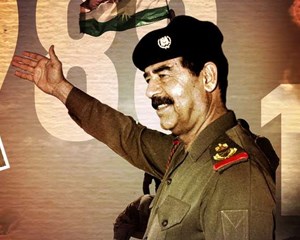There were two reasons for this. First, the events were carefully choreographed through the media: the coalition military controlled which images could be shown, and which journalists were allowed to report. The television-watching public audience in the west was shown non-stop video footage of firework-like bombings, and point-of-view shots of missiles heading to their targets.
原因有二。首先,這些事件是通過媒體精心策劃的:聯軍軍隊控制了哪些圖片可以公開,哪些記者可以報道。西方的電視觀眾看到了不間斷的類似煙花爆炸的視頻以及導彈飛向目標的視角射擊。
The effect was that of playing a computer game: clean, surgical, without consequences. Second, Baudrillard argued, the outcome of the war was never really in doubt: it was "won in advance". The coalition was always going to win, and Saddam, for all his posturing, was in no position to fight back. This simulated war was "stripped of its passions, its phantasms, its finery, its veils, its violence, its images: war stripped bare by its technicians even, and then reclothed by them with all the artifices of electronics, as though with a second skin".
其效果就像玩電腦游戲一樣:干凈利落、沒有后果。其次,鮑德里亞認為,從來沒有人真正懷疑過這場戰爭的結果:它“預定會贏”。聯軍總是會贏,而薩達姆,盡管他擺出各種姿態,卻沒有反擊的余地。這場模擬戰爭“被剝去了激情、幻想、華麗、面紗、暴力和形象:這場戰爭甚至被它的技術人員剝得光禿禿的,然后又被他們重新穿上了電子技術的欺騙伎倆,仿佛披上了第二層皮膚。”

The hyperreality of the Gulf war that Baudrillard described caught the imaginations of writers, artists and film-makers. It looked ever more prescient as the internet began to connect the world. Excitement and anxieties about real versus virtual experiences grew. A hyperreal war was played out in the 1997 political comedy film Wag the Dog (loosely based on a 1993 novel), in which an American president creates a fictional war abroad to distract from a sex scandal at home. Hyperreality was the basis of the 1999 action science-fiction blockbuster The Matrix. The character Morpheus is quoting Baudrillard when he says: "Welcome to the desert of the real."
在鮑德里亞的描述下,海灣戰爭的超現實主義激發了作家、藝術家和電影制作人的想象力。當互聯網開始連接世界時,它看上去越發有預見性了。對真實體驗和虛擬體驗的興奮和焦慮與日俱增。1997年的政治喜劇電影《搖尾狗》(根據1993年的小說改編)講述了一場超真實的戰爭。在這部電影中,一位美國總統在國外制造了一場虛構的戰爭以轉移人們對國內性丑聞的注意力。超現實是1999年動作科幻大片《黑客帝國》的基礎。莫斐斯引用了鮑德里亞的話,“歡迎來到現實的沙漠。”
In 2003, when US-led forces launched Operation Iraqi Freedom and invaded Iraq, the situation would be different. This war would be fought both in "the desert of the real" and in the real desert. A ground invasion was the focus. Resistance was put up by Iraqi forces, and territory was occupied by the coalition, though this war, too, was effectively "won in advance".
2003年,當美國領導的部隊發動“伊拉克自由行動”并入侵伊拉克時,情況變了。這場戰爭將在“現實的沙漠”和真正的沙漠中進行。地面入侵是重點。伊拉克軍隊進行了抵抗,聯軍占領了領土,然而這場戰爭實際上也“預定會贏”。











